Fenja And Menja: Two Giant Sisters, Magical Grotte Mill And Why The Sea Is Salt
A. Sutherland - AncientPages.com - In Norse legends, Fenja and her sister Menja were two giant maidens who mined gold in the Grotte (or the 'World Mill'). It was a legendary, magical mill with two massive millstones that no man had enough strength to grind.
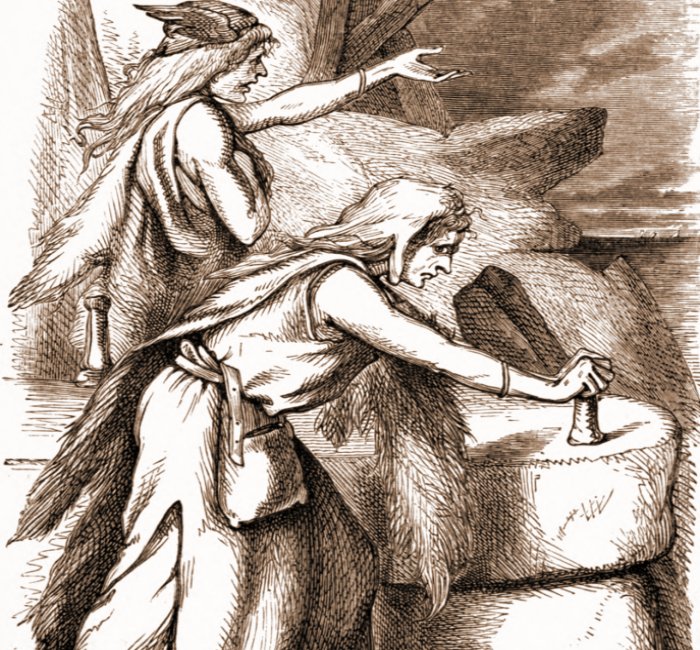 Menia (Menja) and Fenia (Fenja) by W. J. Wiegand, (fl. 1869–1882). source
Menia (Menja) and Fenia (Fenja) by W. J. Wiegand, (fl. 1869–1882). source
The magical mill could grind everything, both good things, including gold, peace, happiness, and terrible things like war, tragedy, and ruin.
Moreover, the mill's magic was that it could grind out what the mill drivers were singing about, but as legend has it, no one had been strong enough to operate the mill.
Initially, Fenja and Menja served for King Fjolner, who lived from the 1st century BC to the early 1st century AD and was the son of Frey (Freyr) and the giantess Gerdr (Gertha), the Ynglinga saga tells. Their story is also mentioned in 'Song of Grótti' (Grottasöngr), an Old Norse poem found in the Poetic Edda and preserved in one of the manuscripts Prose Edda by Snorri Sturluson.
Ruthless King Frode Bought Fenja And Menja
One day, Fjolner (Fjölner) was visited by a Danish King Frode (Frodi) from Zealand, the island, which - as told in the Gylfaginning - was created by Gefjon (Gefion). We remember that Gefjon was the Aesir goddess of fertility, plow, and agriculture.
She cleverly tricked Gylfi, the king of Sweden, by removing a piece of land and transporting it to Denmark, which became Zealand.
King Frode bought the slave giantesses, Fenja and Menja, to care for his powerful Grotti mill with magical properties. It is said that he got it from the mighty god Odin himself.
He was eager to put the women to work when he got home. Perhaps, King Frode's rule was prosperous and delivered a peaceful time for his people, but it was not the same for the giants. Frode was a cruel, heartless, and greedy man.
He had Fenja and Menja tied to the mill and ordered them to grind gold, peace, happiness, and prosperity for him. He did not allow the girls to sleep for more than a moment in his ruthless greed. The sisters could not rest more than the time it took to perform a song.
Was it their fate to be enslaved forever?
Even though mortals had enslaved Fenja and Menja, the girls, fortunately, knew that sooner or later, they would be able to take revenge.
Fenja's And Menja's Revenge
As the sisters worked with the mill, they soon discovered its supernatural powers and learned to control them. Thus, they created a power song we know today as the "Song of Grotte." Before the music ended, they ground an enemy army into existence via the magic mill. This army was led by a king, Mysing, "from over the sea," who was powerful enough to oust Frode, so he did.
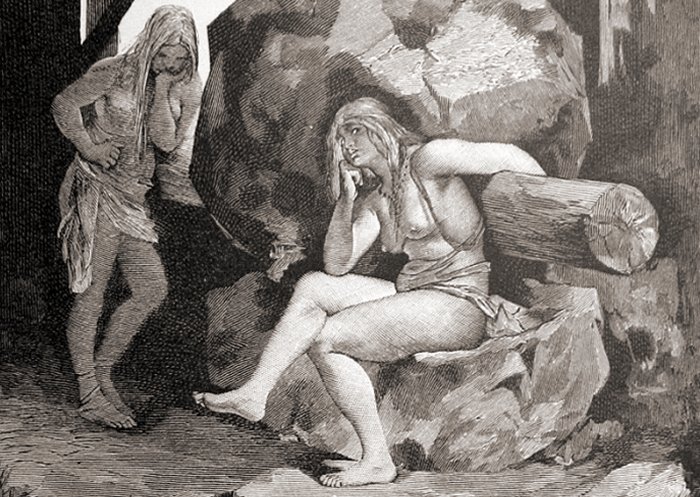 The engraving shows the giantesses Fenja and Menja beside the mill Grótti. One giantess is sitting near the center of the frame while the other is standing by the side. Carl Larsson (1853-1919) and Gunnar Forssell (1859-1903). Published in 1893. Original drawing created in 1886.
The engraving shows the giantesses Fenja and Menja beside the mill Grótti. One giantess is sitting near the center of the frame while the other is standing by the side. Carl Larsson (1853-1919) and Gunnar Forssell (1859-1903). Published in 1893. Original drawing created in 1886.
King Mysing quickly killed Frode and took the slave women and the Grotte mill on his ship with him.
Unfortunately, also this time, the girls had not much luck because Mysing was not better than Frode. Frode wanted unlimited quantities of gold, reminding us of King Midas, who – as told in an ancient Greek myth – was wealthy and greedy and loved gold more than anything else.
King Mysing, on the other hand, wanted to possess unlimited quantities of salt; he forced the sisters to grind it even harder without getting any rest.
Around midnight, they asked if there was not enough salt, but it was not. Mysing wanted more and ordered the women to continue grinding. In revenge for their endless suffering, the two giant women started to sing the "Song of Grotti," which brought misfortune to Frode. This time, however, the sisters did not intend to give up their fate but fought to the end.
They worked only a short time longer before the disaster happened.
In the sea, a gigantic vortex, known as the Maelstrom (Mill-Stream), formed by the sea spiraling through the hole in the millstone of Grotte. Mysing's ship broke down, was pulled down through this powerful opening, and sank. All Mysing's ships went down; the Grotte Mill also fell with them.
The sea began turning salt. Since then, the sea has been salty, says the myth.
Where Are Fenja And Menja Now?
According to some old stories, the two unhappy girls still work at the mill. One version of the myth says that the two sisters, no longer oppressed and humiliated by any man, happily returned to Jotunheim with Grotte, which they used to grind out gold dust and export to many places around the world. Their house - covered in gold dust - was often visited by people who wanted to steal the magical mill or the sisters' wealth. None of those visitors have yet survived to tell the story.
Another legend says that Stroma, an island off the northern coast of the mainland of Scotland, is known to have a dangerous whirlpool with a Norse name: Swelki ("sea mill"). Legend has it that two giant women, Grotti-Fenni and Grotti-Meni, live under the seafloor and cause dangerous whirlpools - an unavoidable threat to passing sailors.
Written by – A. Sutherland - AncientPages.com Senior Staff Writer
Updated on April 12, 2023
Copyright © AncientPages.com All rights reserved. This material may not be published, broadcast, rewritten or redistributed in whole or part without the express written permission of AncientPages.com
Expand for referencesReferences:
Stephen Liley, Olaf's Saga
Sturluson S. The Younger Edda
Sora S. The Triumph of the Sea Gods
More From Ancient Pages
-
 Kingdom Of Mitanni: Forgotten For Millennia But Once Great Power Of Ancient West Asia In 2000 BC
Featured Stories | Jun 20, 2023
Kingdom Of Mitanni: Forgotten For Millennia But Once Great Power Of Ancient West Asia In 2000 BC
Featured Stories | Jun 20, 2023 -
 Mysterious Sumerian Star Tablet And Strange Divine Omens – Communication With The Gods – Part 2
Featured Stories | Feb 18, 2021
Mysterious Sumerian Star Tablet And Strange Divine Omens – Communication With The Gods – Part 2
Featured Stories | Feb 18, 2021 -
 Ancient Ziggurat Of Aqar Quf Dedicated To God Enlil
Civilizations | May 3, 2019
Ancient Ziggurat Of Aqar Quf Dedicated To God Enlil
Civilizations | May 3, 2019 -
 Discovery Of Chromosomes Offers Evidence Of Ancient Humans Living In South America Over 18,000 Years Ago
Archaeology | Aug 21, 2022
Discovery Of Chromosomes Offers Evidence Of Ancient Humans Living In South America Over 18,000 Years Ago
Archaeology | Aug 21, 2022 -
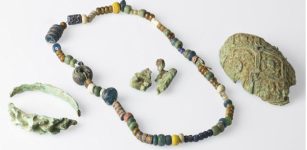 Puzzling Jewellery From Grave Of High Status Viking Woman Delivered At Museum’s Door
Artifacts | Jul 23, 2022
Puzzling Jewellery From Grave Of High Status Viking Woman Delivered At Museum’s Door
Artifacts | Jul 23, 2022 -
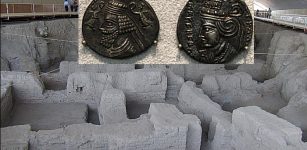 Mysterious Medes: Was It An Ancient City Of Ecbatana?
Archaeology | Jul 3, 2020
Mysterious Medes: Was It An Ancient City Of Ecbatana?
Archaeology | Jul 3, 2020 -
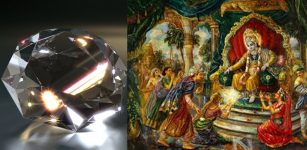 Syamantaka – Divine Jewel With Magical Powers Was A Gift From The Sun God In Hindu Mythology
Featured Stories | Mar 1, 2019
Syamantaka – Divine Jewel With Magical Powers Was A Gift From The Sun God In Hindu Mythology
Featured Stories | Mar 1, 2019 -
 Mysterious Ancient Star People Of The Secret Power
Civilizations | Sep 12, 2018
Mysterious Ancient Star People Of The Secret Power
Civilizations | Sep 12, 2018 -
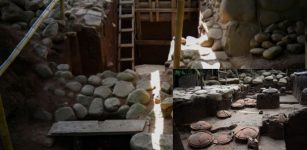 2,000-Year-Old Stela And ‘Laboratory’ Of Early Maya Writing Found In Guatemala
Archaeology | Mar 15, 2020
2,000-Year-Old Stela And ‘Laboratory’ Of Early Maya Writing Found In Guatemala
Archaeology | Mar 15, 2020 -
 Machine-Learning Model Can Detect Hidden Aussie Rock Art
Archaeology | Jun 28, 2022
Machine-Learning Model Can Detect Hidden Aussie Rock Art
Archaeology | Jun 28, 2022 -
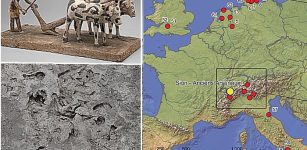 Exciting Find In The Swiss Alps – First Furrows And Animal Tracks Are Evidence Of Prehistoric Plowing
Archaeology | Apr 3, 2024
Exciting Find In The Swiss Alps – First Furrows And Animal Tracks Are Evidence Of Prehistoric Plowing
Archaeology | Apr 3, 2024 -
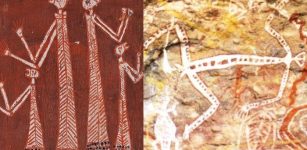 Immortal Mimi Spirits In Beliefs Of Aborigines Of Arnhem Land
Featured Stories | Mar 26, 2020
Immortal Mimi Spirits In Beliefs Of Aborigines Of Arnhem Land
Featured Stories | Mar 26, 2020 -
 Controversial 3D Reconstruction Of 10,000-Year-Old Apiuna Man Reveals First Americans Came From Africa
Archaeology | Jun 6, 2017
Controversial 3D Reconstruction Of 10,000-Year-Old Apiuna Man Reveals First Americans Came From Africa
Archaeology | Jun 6, 2017 -
 10 Remarkable Ancient Indian Sages Familiar With Advanced Technology And Science Long Before Modern Era
Featured Stories | Oct 19, 2015
10 Remarkable Ancient Indian Sages Familiar With Advanced Technology And Science Long Before Modern Era
Featured Stories | Oct 19, 2015 -
 Mysterious Green Light And Ancient Treasures – Cave Of The Gods And Its Secrets
Featured Stories | Jul 3, 2018
Mysterious Green Light And Ancient Treasures – Cave Of The Gods And Its Secrets
Featured Stories | Jul 3, 2018 -
 2,800-Year-Old Urartu Jars Uncovered In Eastern Turkey
Civilizations | Sep 9, 2015
2,800-Year-Old Urartu Jars Uncovered In Eastern Turkey
Civilizations | Sep 9, 2015 -
 Abu Simbel – Spectacular Ancient Egyptian Temples Unique In Design And Size
Featured Stories | Jun 12, 2021
Abu Simbel – Spectacular Ancient Egyptian Temples Unique In Design And Size
Featured Stories | Jun 12, 2021 -
 Tomb Of Pharaoh Ramesses II Treasurer Ptah-M-Wia Discovered In Saqqara
Archaeology | Nov 4, 2021
Tomb Of Pharaoh Ramesses II Treasurer Ptah-M-Wia Discovered In Saqqara
Archaeology | Nov 4, 2021 -
 Isle Of May Was A Pictish Healing Center – Monks Used Herbs To Treat Sick And Dying People
Archaeology | Feb 16, 2018
Isle Of May Was A Pictish Healing Center – Monks Used Herbs To Treat Sick And Dying People
Archaeology | Feb 16, 2018 -
 Inca Llajta: Largest And Most Impressive Inca Complex In Bolivia
Civilizations | Dec 6, 2018
Inca Llajta: Largest And Most Impressive Inca Complex In Bolivia
Civilizations | Dec 6, 2018
